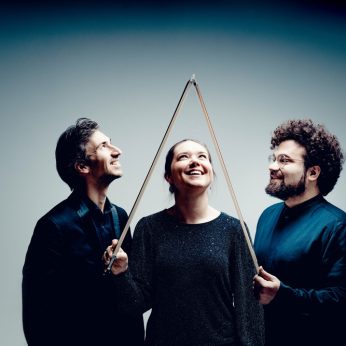Composer: Klas Torstensson (b. 1951)
Performance date: 29/06/2023
Venue: St. Brendan’s Church
Composition Year: 2004
Duration: 00:45:02
Recording Engineer: Gar Duffy, RTÉ
Instrumentation: vn, vc, pf
Instrumentation Category:Piano Trio
Artists:
Trio Gaspard (Jonian Kadesha [violin], Vashti Hunter [cello], Nicholas Rimmer [piano]) -
[Piano Trio]

In grosser Sehnsucht – A cycle of songs [2004]
1. Lettres non expédiés (La Valse) – Camille Claudel
2. Árbol de la Esperanza – Frida Kahlo
3. Le dolci parole – Cristina di Svezia
4. In grosser Sehnsucht – Rosa Luxemburg
5. Océaniennes – Louise Michel
Camille Claudel, Frida Kahlo, Cristina of Sweden, Rosa Luxemburg and Louise Michel, five feisty and extraordinary women who have left their marks on history, five women who refused to accept things as ordered by a male-dominated world and in one way or another paid a heavy price. Camille Claudel was a sculptress of genius, a student and then mistress of an even greater sculptor, Auguste Rodin. When their relationship disintegrated, Camille herself fell apart psychologically and her dreadful family, fearful for their reputation, had her incarcerated in an asylum for over thirty years. The intrepid Mexican artist, Frida Kahlo, suffered appalling physical pain most of her life as a result of childhood polio and a terrible traffic accident in her youth, but she made an artwork out of her life, vividly recording it in her astounding paintings and amazing diaries. With the other four protagonists in this music drama she shared a total disregard for conventional morals and sexuality and, like Camille Claudel, her love life did not go smoothly.
Cristina of Sweden, daughter of the great Gustavus Adolphus, is famous for her refusal to marry, her dressing as a man, her conversion to Catholicism when Queen of Protestant Sweden in the aftermath of the Thirty Years War, her eventual abdication and exile in Italy where she became a patron of the arts. She has long been an icon of the lesbian and feminist communities. Rosa Luxemburg was the founder of the anti-war Spartacist League in Germany during the First World War after failing to get the German Social Democratic Party to oppose the War. She was imprisoned from 1916-18 and assassinated shortly after her release by the right-wing Freikorps, as one historian put it, the first triumph of Nazi Germany. Louise Michel was an anarchist of renown, who fought on the barricades during the Paris Commune, was deported to New Caledonia. Known as La Louve Rouge – La Bonne Louise she spent her life after the amnesty for the Communards in and out of prison refusing to back down from her support of the dispossessed.
In grosser Sehnsucht uses text fragments collected from personal diaries (Frida Kahlo), letters from prison or a lunatic asylum (Rosa Luxemburg and Camille Claudel respectively), speeches given in her defence and poems written in exile (Louise Michel), and a pastoral drama – favola pastorale – (Cristina di Svezia, allegedly the literary collaborator of the Italian poet and dramatist Alessandro Guidi).
The composer says he in no way claims to do complete justice to these five more or less tragic women in their complex relationship to the time in which they lived, I do hope to have given each of them a plausible ‘musical identity’. Some of the songs contain elements drawn from the musical idiom of the time, even including quotations gleaned from historical musical artefacts. At times these quotes are obvious, and at other times they are discreetly concealed.
This work is a dramatic tour de force in four languages – from the terrifying outcry of Camille Claudel locked in a prison perpetuelle to Louise Michel’s scornful challenge to her judges – si vous n’êtes des lâches, tuez-moi. Singer and trio combine to bring these five powerful and remarkable women to vivid life.
Francis Humphrys
Copyright © 2025 West Cork Music. All rights reserved.
Designed and developed by Matrix Internet